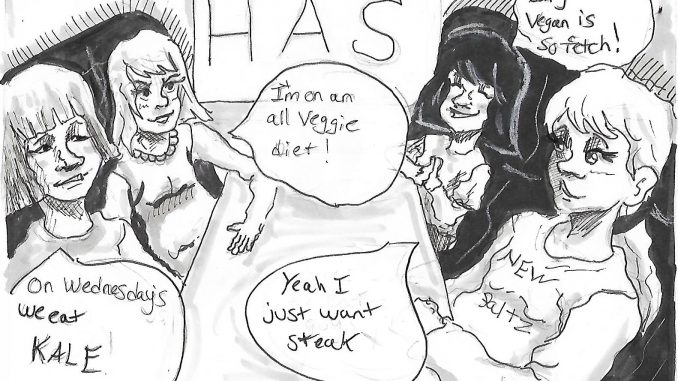
This past Saturday, Oct. 1 was World Vegetarian Day, an annual celebration of the founding of the United Kingdom’s Vegetarian Society in 1977. Vegetarianism has become popular in the media, with celebrity vegetarians and vegans and “cruelty-free” communities gaining traction in mainstream publications and on the Internet.
In the spirit of World Vegetarian Day, we at The New Paltz Oracle would like to encourage our readers to think critically about the products they purchase and consume. We recognize that not everyone has the resources or means to be a vegetarian or vegan. For students at SUNY New Paltz who live on campus, access to cooking supplies or fresh ingredients for self-made meals can be few and far between.
Likewise, we acknowledge that no diet or lifestyle is perfect, and that vegans and vegetarians should consider the environmental impact of the foods they choose to consume as well. There are, however, steps that anyone can take to be a conscious consumer.
Today, most people are aware of the cruel treatment animals receive on behalf of the livestock and dairy industries, but few are aware of the devastating impact these industries have on the environment. According to a 2013 study from Australian and Austrian researchers, global meat production accounts for some 40 percent of the world’s total land use and 18 percent of human-produced greenhouse gas emissions. Most of the meat produced goes to Western countries, where people are able to afford beef and poultry products, and where the demand is shockingly high — the same study reported that Americans eat 250 pounds of meat per year on average.
Pescetarians, who eat fish and dairy products but abstain from consuming meat and poultry, may believe they are doing better for the planet than omnivores. Sadly, the commercial fishing industry is plagued with sustainability issues as well. A report from the National Oceanic and Atmospheric Association detailed predicaments of overfishing, which has drained natural fish populations in certain areas of the world’s oceans, and coral reef devastation, which results from the massive-scale nets used to catch fish in the commercial fishing process.
What about dairy? Many people know about the sad fates that female cows face at the expense of the Western world’s addiction to cow milk. But even dairy alternatives like almond milk have their pitfalls. A 2015 article from The Guardian detailed the massive amounts of water used to supply America’s love of almond milk; according to the article, it takes 1.1 gallons of water to grow one almond and more than 100 liters of water to produce 100 milliliters of almond milk. This predicament is compounded by the fact that most of America’s almond milk is produced in the state of California, which is in the midst of a record-breaking drought.
Opting for “Meatless Mondays,” or avoiding meat products for a certain timeframe each week, can be significant factor in reducing the environmental impact of your dinner plate. According to the Environmental Working Group, if everyone in the United States cut meat and dairy out of their diet just one day a week, “it would be like not driving 91 billion miles – or taking 7.6 million cars off the road.”
For those who can afford it, community-supported agriculture (CSA) serves as an alternative to traditional grocery shopping; consumers are able to rent a small plot of land on a CSA farm and keep any fruits and vegetables grown on their plot. Produce obtained via “farm shares” is organic, and the locality of the farm ultimately produces a smaller carbon footprint when it comes to transportation.
At SUNY New Paltz, students can reach out to the Students for Sustainable Agriculture for advice on being a kinder, more conscious consumer to both our planet and the creatures who inhabit it. Additionally, campus nutritionist Emily Ferencik is available for consultations with anyone aiming to healthfully change their eating habits. For more information, email Ferencik at Ferencike@newpaltz.edu or check out the Students for Sustainable Agriculture’s Facebook page.
